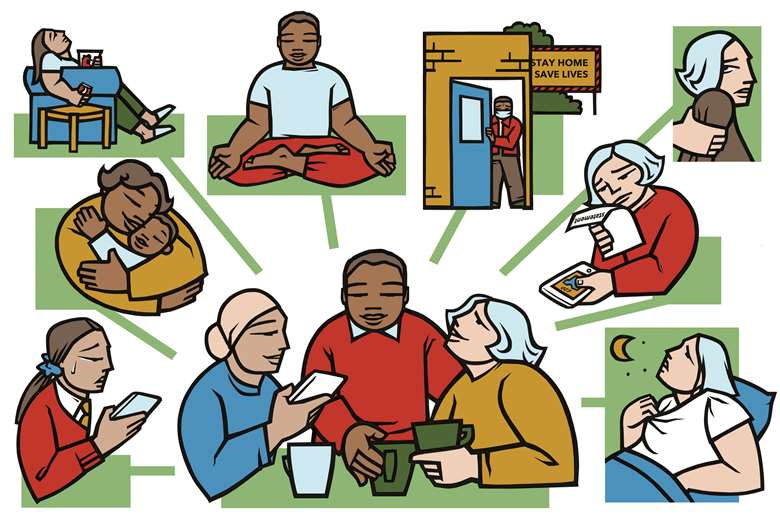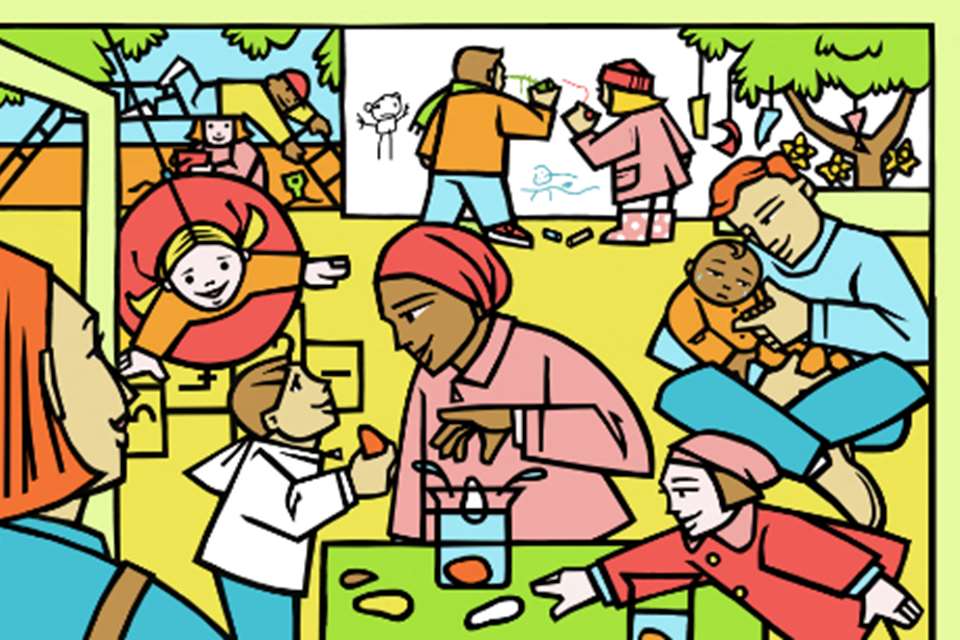Staff Health & Well-Being: Part 1 - The state we’re in
Charlotte Goddard
Tuesday, May 4, 2021
In the first part of a new series looking at staff health and well-being, Charlotte Goddard sets out how healthy we are as a society, and sector, and how inequality affects this

Illustration: Amanda Hutt
As a nation, we are increasingly unhealthy. More than a quarter (28 per cent) of adults in England are obese. More than one in five (21 per cent) are getting less than 30 minutes’ exercise a week, and 23 per cent drink too much alcohol. Despite all this, the leading cause of sickness absence is not physical but mental health problems, according to the Mental Health Foundation.
Good health is unequal
Health and well-being issues are not experienced to the same degree by everybody. Women have a higher percentage of mental disorders than men in each income bracket, and almost twice as many women as men are diagnosed with anxiety disorders. The pandemic has also shone a light on health inequalities faced by black and ethnic minority communities. Rates of infant mortality, cardiovascular disease and diabetes are higher among Black and South Asian groups, for example.
These unfair and avoidable differences in health across the population, and between different groups within society, are known as ‘health inequalities.’ The demographics of the early years workforce – mostly female, low-paid, and often with lower educational attainment – makes many more vulnerable to health problems (see below).
Poverty
In general, poorer families face the greatest risks to their health. We know the early years workforce is one of the least-well-paid sectors in society, with ‘low-paid workers … ultimately bear[ing] the consequences’ of Government underfunding, according to the 2020 annual report from the Low Pay Commission, and 44.5 per cent of childcare workers claiming state benefits or tax credits, according to the Education Policy Institute.
‘There are settings operating in some of the most deprived areas, and a large part of the workforce often comes from that same community,’ says Melanie Pilcher, quality and standards manager at the Early Years Alliance. ‘So when that community is struggling, they are struggling. If you happen to be in an area where a high proportion of families are using food banks, it is likely a good proportion of your staff are doing the same.’
Stress and social problems attached to poverty and debt can lead to mental health problems, worsen existing mental health problems, and hinder recovery. People in poorer areas are more likely to have shorter lives and disabilities than those in more affluent areas, according to a 2020 report from the British Medical Association. According to NHS Digital, people with the lowest income in England are more likely to have diabetes and to be obese (30 per cent of men and 39 per cent of women in the lowest income group).
Pandemic
The pandemic has exacerbated many of these heath inequalities. There have been direct impacts on mental health and well-being, with a surge in domestic violence (calls to one helpline rose 60%), increases in stress and anxiety, and more people suffering bereavements. There are also likely effects on health and well-being caused by the pandemic’s impact on the economy and inequality. The number of households receiving Universal Credit almost doubled in the past year, while 693,000 fewer people were in paid employment in February this year compared to a year ago.
School shutdowns are likely to accentuate the existing divide in educational attainment, as schools attended by children from better-off families are more likely to provide learning activities that involve active engagement between teachers and students. The Office for National Statistics also found more women than men reported that home schooling was having a negative impact on their well-being (53 per cent compared with 45 per cent).
‘Settings have had to give staff time off to care for their own children and this has had an impact on them financially,’ says Paula Dunn, early years adviser at the National Day Nurseries Association.
Early years practitioners have had to deal with everything that affects the wider community – illness, childcare and home schooling issues, bereavement, domestic abuse, isolation from friends and family – while also facing stresses unique to their role.
‘Early years have not been able to implement safety measures, they can’t socially distance, they can’t wear personal protective equipment, they weren’t given home testing kits initially or prioritised for vaccination, and that has left them feeling more anxious and less safe at work,’ says Letitia McCalla, professional officer at education union Voice.
Meanwhile, the Early Years Alliance says its webinars on mental health and well-being have been oversubscribed.
Policy
With health problems piling up even before the pandemic, the Government is putting strategies in place to deal with issues such as inequality, obesity and mental health. The Opportunity Area scheme, which aims to close the gap between the disadvantaged and more advantaged, has been extended for a fourth year and expanded to 12 more areas, for example.
However, there have been concerns that measures are piecemeal, and do not go far enough. The national obesity strategy, for instance, has been criticised for failing to tackle the roots of obesity – poverty and poor educational attainment – although it does commit to expand NHS weight management services and reduce marketing opportunities for junk food.
The well-being of young children is directly tied to the emotional functioning of their caregiver. When practitioners experience stress, this can lead to a reduction in the quality of care they are able to provide, says the Early Years Alliance’s Ms Pilcher. ‘Children learn from and take cues from the people around them, and if those people’s own mental health is suffering, it will affect them.’
Settings already struggling to recruit are also likely to lose staff due to health problems. ‘If these issues are not addressed, there will be a rise in staff sickness, or of practitioners thinking “I can get the same salary at Tesco”,’ says the NDNA’s Ms Dunn.
At the root of everything is money, with many settings unable to pay a fair wage in order to lift staff out of poverty and make them feel more valued because they are struggling with Government underfunding and lack of support. ‘Funding is at the crux of it,’ says Ms McCalla. ‘At present, funding is not adequate to enable managers and owners to support staff in the ways that they need’.
The Early Years Workforce Commission is calling for a campaign to promote the importance of early education, improved CPD, fair funding for settings and fair pay for practitioners.
Many settings are doing their best to support staff well-being, and Ofsted is focusing more on how settings support their staff under the new Education Inspection Framework. But without greater Government support, there can be no sustainable change.
The early years workforce in England
Mostly female Only 1.8 per cent of nursery nurses and assistants, and four per cent of childminders and people in related occupations, are male, according to the Education Policy Institute (EPI). The National Day Nurseries Association (NDNA) found men make up less than one per cent of the workforce in smaller settings in its 2019 Workforce Report.
Stressed A quarter of respondents to the Early Years Alliance’s 2018 Mind Mattersreport were considering leaving the early years sector due to stress or mental health difficulties. Two-thirds said their personal relationships have been negatively affected by work-related stress or mental health difficulties. Forty four per cent had felt stressed about work or an issue relating to work ‘very often’. The top sources of stress were ‘administration and paperwork’, ‘financial resources of the setting’, ‘workload’ and ‘pay’. The most commonly cited health impacts were fatigue (60 per cent), loss of motivation (58 per cent), anxiety (57 per cent) and insomnia (53 per cent).
Low-paid A Nursery World survey in 2019 found half of early years workers earn less than £17,000 a year. A third spend more than 30 per cent of income on housing costs, and nearly one in five have £100 or less left to spend per month in their household once bills are paid. In England, the average wage across the early years workforce is £7.42 an hour, well below the national living wage of £8.91, and more than £5 an hour less than the average for the total population (£12.57), according to a 2020 Social Mobility Commission report.
According to the EPI, in 2018, 44.5 per cent of childcare workers were claiming state benefits or tax credits. The Early Years Workforce Commission found 64 per cent had not had a pay rise in the previous two years or more.
Hit by the pandemic Well over a third – 38 per cent – of early years staff were placed on furlough between the months of November 2020 and February 2021, the EPI reports. Ceeda and the Early Years Alliance estimated in January there were 8,000 early years staff unable to work during lockdown due to their own children not accessing a school place.
Not highly qualified The number of Level 3 staff fell from 66 per cent in 2017-18 to 52 per cent in 2018-19; the number of graduates and Early Years Teachers fell from 13 per cent to five per cent; while the number of unqualified staff rose from 10 per cent to 26 per cent, according to the NDNA. The EPI found that a third of female childcare workers left full-time education at 16.
Download Now








